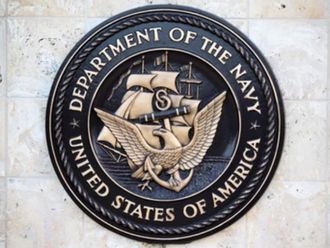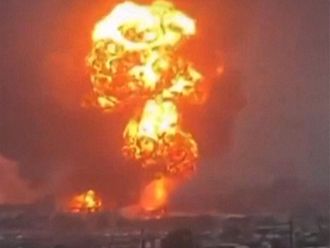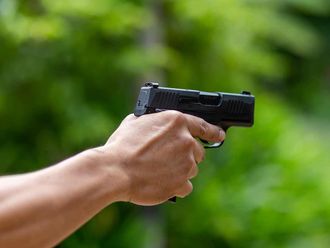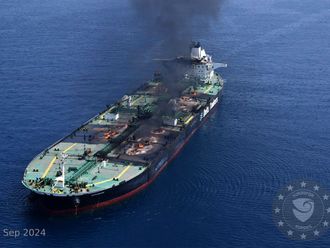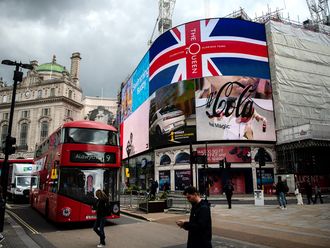Sana'a: Al Qaida wasted no time in retaliating at Yemen's security forces that drove them out of Al Huta village, in the southern province of Shabwa, earlier this week.
On Wednesday, the terror network tried to assassinate the military, security and political leaders who had led the campaign against them in Al Huta.
One soldier was killed and seven others injured when Al Qaida gunmen ambushed the governor of Shabwa Ali Al Ahmadi, the deputy chief of general staff, Salem Al Kotn, security director, Ahmad Al Makdashi and other officials in the area of Yashbom, between Atak and Al Saeed. The security forces are still running after the attackers, who used rocket-propelled grenades to strike the convoy.
"The attackers were Al Qaida members and separatists," the security director of Shabwah said.
"Al Qaida attacks are now based on three motives: to prove they are still strong, to take revenge or to recruit," said Saeed Al Jemhi, chairman of the Al Jemhi Centre for Studies, a think-tank which specialises in Al Qaida affairs.
Al Jemhi believes that almost 50 per cent of the fighters and leaders of Al Qaida in Yemen are Saudis.
"Saudis are important for financing [the movement] and for their experience," he said.
Yemeni forces did not find any Al Qaida men in Al Huta after they overrun the townlast Friday.
They managed to take control of the town after a siege which lasted four days, in which about 100 Al Qaida gunmen were cornered by US-trained anti-terrorist forces who came from all directions, according to security officials.
The government said that five Al Qaida fighters and two soldiers had been killed and 32 Al Qaida suspects were arrested, while many others from both sides were injured during the attack. The security forces are still looking for the remaining Al Qaida members who are believed to be hiding in neighbouring mountains, between Shabwah and Hudhrmout in the east of the country.
Local residents, however, said that Al Qaida fighters escaped in the western direction of Al Huta and went to Mareb province, one of the strongholds of Al Qaida, about 250km east of the capital Sana'a.
"Al Qaida realised in the end that the army would destroy the town, so they withdrew, they know what they're doing, and the army was lying when they said they surrounded the town from all directions," said Abu Ahmad from Al Huta. "I think they went to Mareb because they escaped from the western part of the town, in the direction of Mareb."
The opposition abroad, who support the separatist movement in the south, have accused the government of using Al Qaida as a justification to attack separatists and to divert the attention of the world from the southern issue.
"Those who attacked Al Huta were hoping to secure financial assistance under the pretext of fighting terrorism, and, from a political point of view, to divert the attention of the world leaders from the southern issue," said Ali Salem Al Baidh, the former president of the south before unity in 1990.
Now based in Germany, Al Baidh regularly calls for separation.
While Yemeni security forces were combing the town of Al Huta on Friday, delegations from about 27 countries from the GCC, EU, US, Japan and other international agencies and donors, known as Friends of Yemen, were in a meeting in New York to assess a plan to help Yemen with its political, economic, developmental and security problems. The Friends of Yemen said in a statement that they supported the unity, security, and stability of Yemen.
The US plans to give Yemen $1.2 billion (Dh4.40 billion) in military aid to fight Al Qaida over the next six years. US military assistance to Yemen in 2010 has increased by $155 million (Dh569.34 million).
Dubai (AFP) Yemen's foreign minister claims the US has launched attacks on Al Qaida in his country, in an interview published yesterday. This is the first confirmation from Sana'a of US military involvement in Yemen.
Abu Bakr Al Kurbi told the pan-Arab daily Al Hayat that the US strikes were suspended in December because his government viewed them as counterproductive. "Fighting Al Qaida is the responsibility of the security and the anti-terrorism forces in Yemen," Al Kurbi said.
However, The New York Times reported that the US military had carried out a secret air strike in May against a suspected Al Qaida target in Yemen, killing a deputy provincial governor in the process. Al Kurbi also said that while Yemen had launched a man hunt for US-born jihadist preacher Anwar Al Awlaqi, who is on a US most-wanted list, it would not hand him over if it succeeded in capturing him.
"Al Awlaqi is hiding in an area where we're conducting operations against Al Qaida," the foreign minister said.
Do you think the US’ help is beneficial or a hindrance? Do you think Yemen is equipped to handle Al Qaida on their own? Tell us what you think at readers@gulfnews.com


